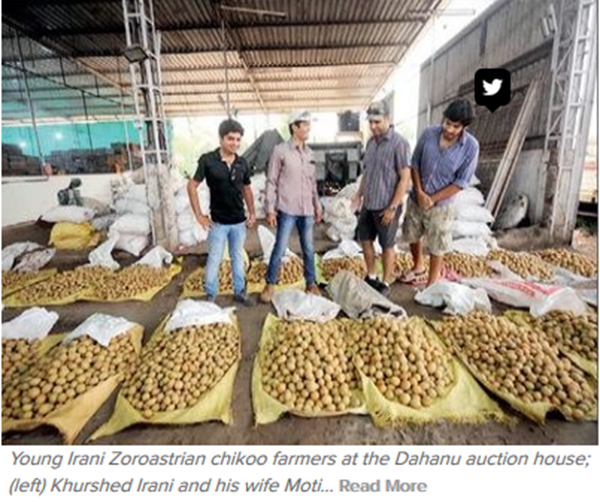There was a time when the humble chikoo with its grainy sweetness was as exotic as the bristly rambutan. Far from being native to India, the sapodilla or chico zapote–as it’s known in Spanish–hails from Southern Mexico, Central America and the Caribbean.According to a 1995 Parsiana article, it was imported to India in the 1890s and planted in Parsi textile magnate Sir Dinshaw Maneckji Petit’s garden in Nana Chowk where Ness Baug now stands. These saplings then hitch-hiked to Dahanu taluka in 1901 when Petit’s estate manager, Ardeshir Irani, a second-generation Irani refugee, set up the first chikoo garden east of the Suez on a one-acre plot in Bordi village.
Article by Nergish Sunavala | Times of India
Soon, Ardeshir, who started life as a mill `mazdoor’, had purchased another eight-acre plot and named his imposing home and garden `Bage Eram’ or `Garden of Paradise’ in Persian. Ardeshir’s success drew more Zoroastrian refugees from Iran like Bemun Khushroo Nassrabadi, a woodcutter, who at 13 walked for 18 months from his native Nassrabad in Iran’s Yazd province to Bombay before settling in Dahanu where he slaved for years with adivasi workers to grow orchards. Decades later, the hard work paid off. Chikoo farmers recall bumper crops in the 1970s with prices skyrocketing to Rs 120 per 10kg. The DahanuBordi-Gholwad belt was labeled the chikoo bowl of India.”We could buy a house in Bombay every year with the amount of money we were making,” says a chikoo farmer with a 117-year-old farm.
Around 75 Irani farms still exist but the fruit’s heyday is over. The first blow came when the Bombay Suburban Electric Supply Company set up a thermal power station, now run by Reliance Energy , in1996.Suddenly , harvests fell and the once-perfect fruit was infested by pests like the seed borer. Today , the more urgent problem is a paucity of cheap labour.Adivasi workers perceive factory jobs as more prestigious so the younger generation is opting to work longer hours for more pay in the nearby Umbergaon and Boisar industrial zones. “Buses pick them up from home and take them to work,” says Khurshed Rashid Irani.
Khurshed, a former Central Bank of India employee in Bombay , moved to Dahanu in 1976 to help his father-in-law run his chikoo farm. He started a bakery 18 years ago to supplement his income. Most chikoo farmers have an alternate occupation–Ronnie Boman Irani runs Hotel Pearline opposite Dahanu beach besides cultivating chikoos and the Mubaraki brothers have set up afishery on their chikoo farm. Many would like to sell their land but are holding on in the hope that the notification of “ecologically fragile green zone” will eventually be lifted causing land prices to soar.”I’m just keeping my 5-acre farm as an investment because it’s breaking even for now,” says Ronnie, who runs Pearline.”There’s a port coming up in Dahanu and if it brings a highway running past my farm that could get me more money .”
To ensure middlemen don’t eat up the profits, Dahanu’s Zoroastrian farmers set up the first auction house in 2003. Every day , between 50 and 150 tonnes of chikoo make their way to a rambling warehouse whe re the fruit is graded and then sold to the highest bidder. On the day TOI visited, a group of young Zoroastrians sporting cargo pants, sunglasses and pea caps were there to negotiate prices on their produce.
They are the next generation of Irani chikoo farmer – a fast vanishing breed – who despite having degrees and other career options have chosen to return to farming because they love the simple life. Some like Sharom Mubarakai studied sports management in England, while Farzan Mazda was a professor at Symbiosis in Pune. Others like Khodadad Irani want to give their children the chance to grow up on a farm.
Khodadad and Mazda are both related to Merwan Khodadad Irani, who transformed the industry when he grafted the chikoo sapling on the rhine tree to strengthen the root system. A 1970 article, published in TheIllustrated Weeklyof India, describes Merwan as a “Biblical patriarch” living on a prosperous 120-acre estate. But Khodadad recalls something more touching. “He never spoke much at home but he would walk around the farm constantly talking to his trees.”


